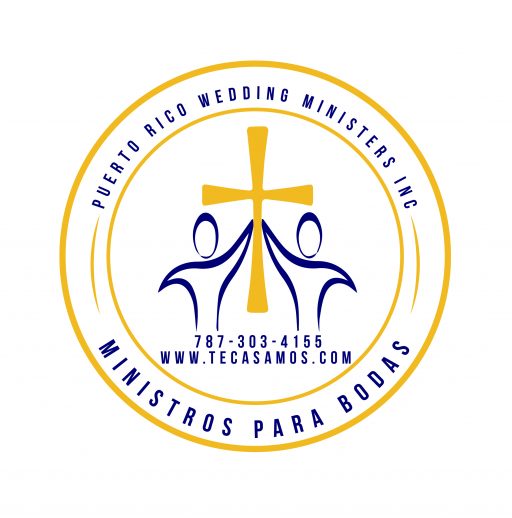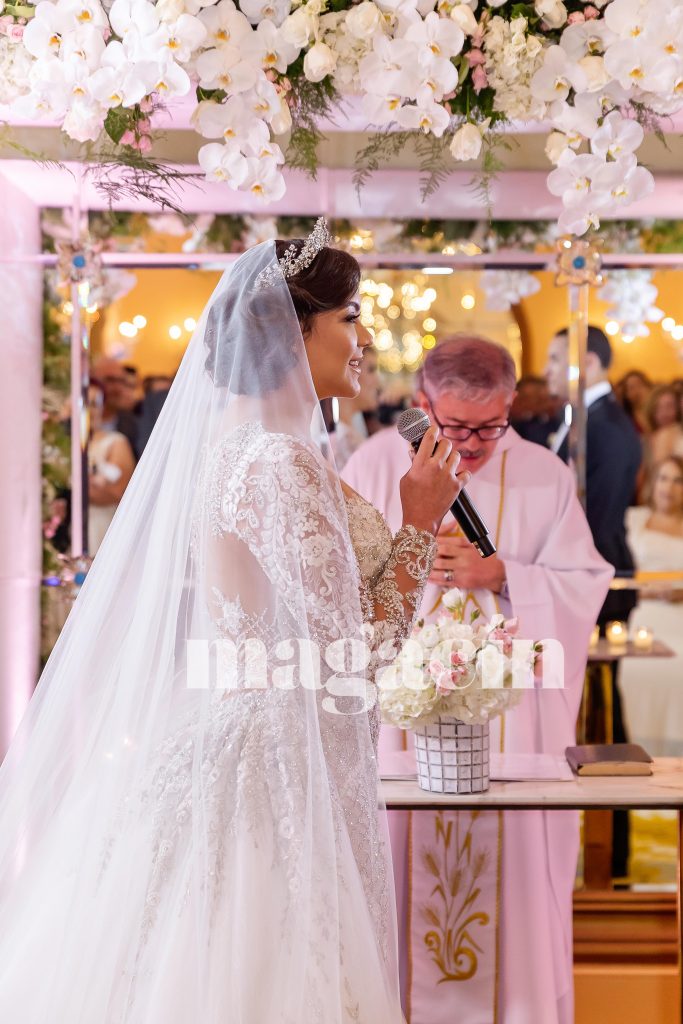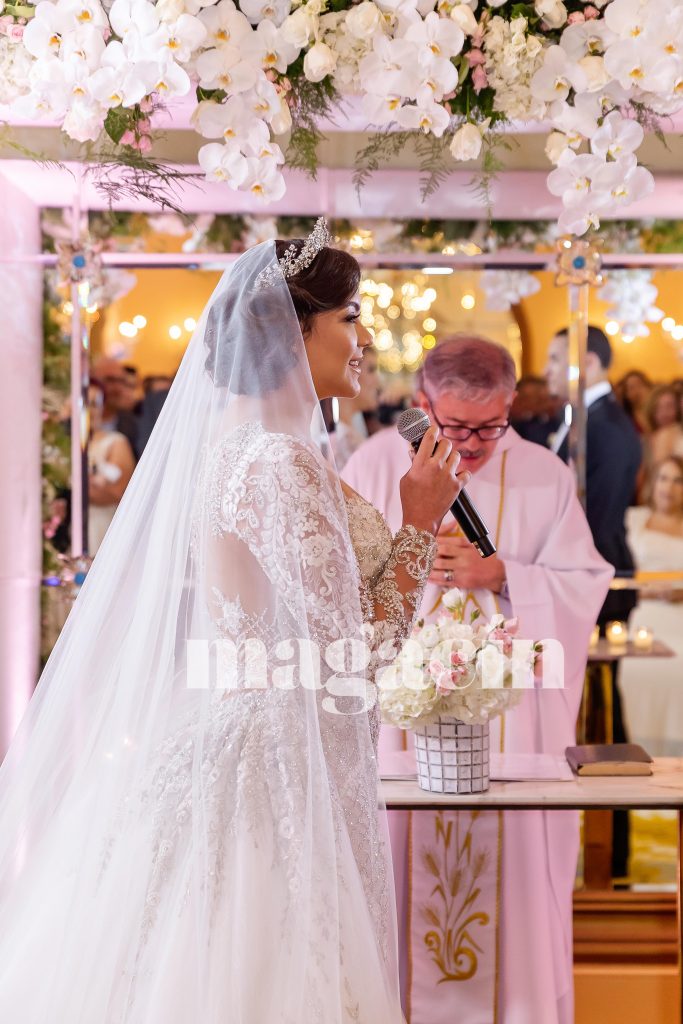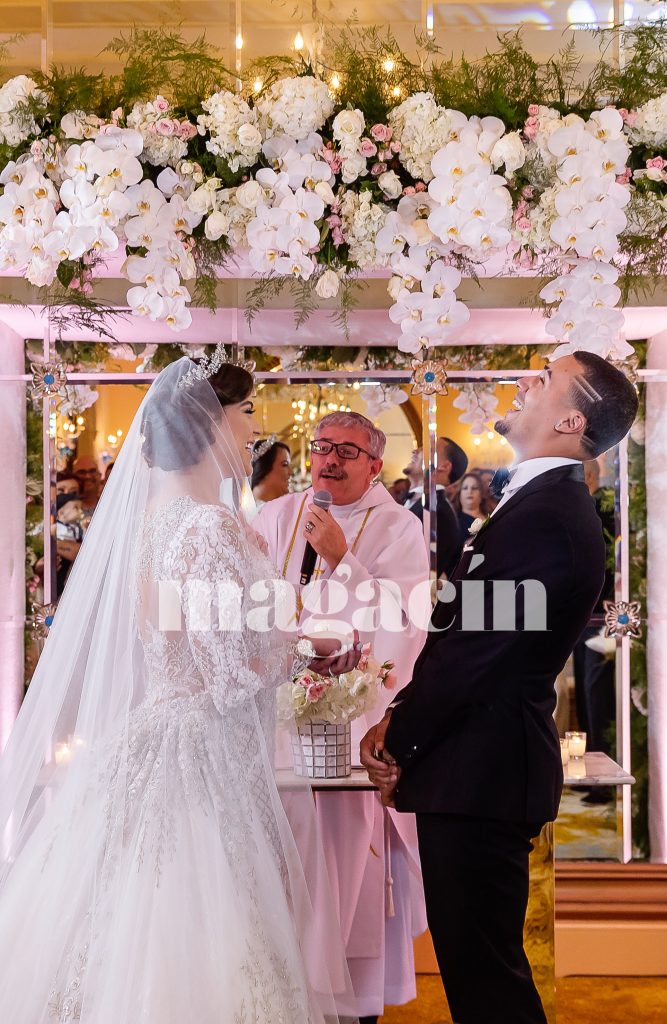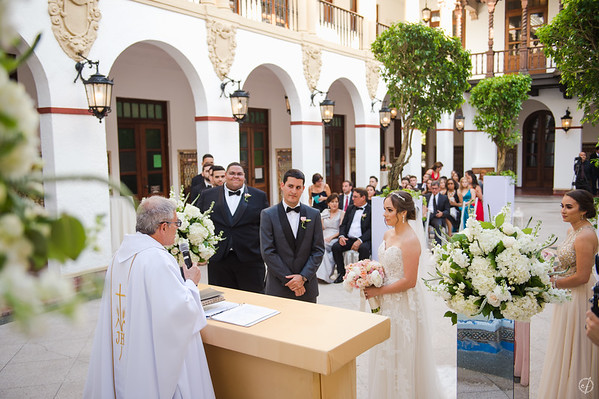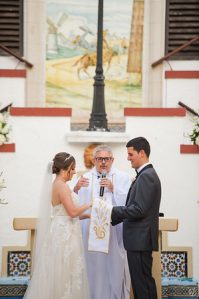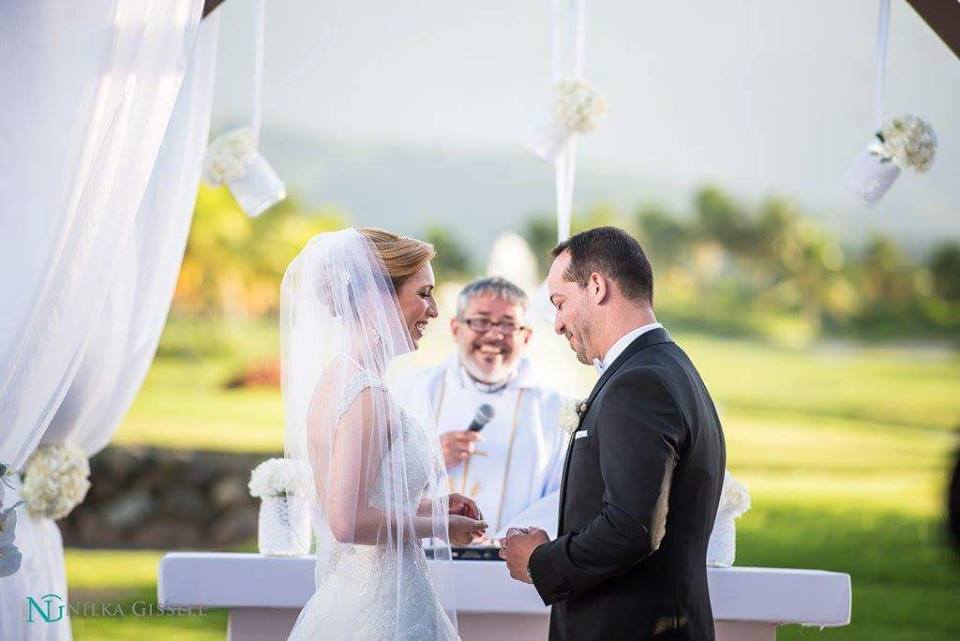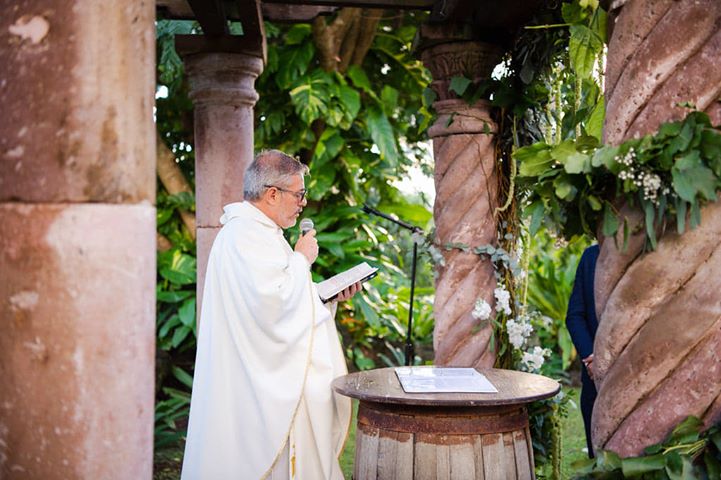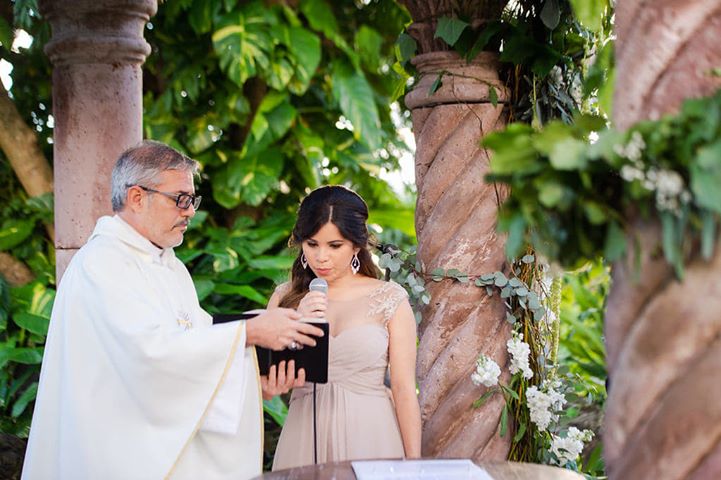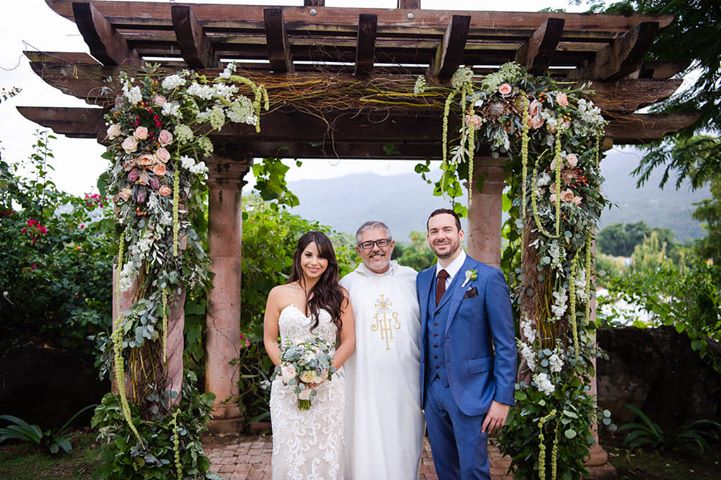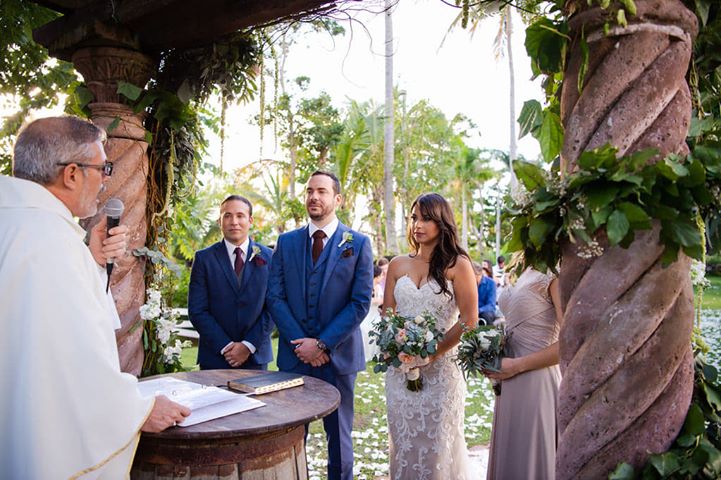Catholic Priest for a real Catholic Rite
Rito Catolico
Solo un Sacerdote puede casar dentro o fuera de una Iglesia
La Iglesia Católica prevé que, de ordinario, el matrimonio se celebre en la iglesia parroquial. Es posible, sin embargo, celebrar el matrimonio en otro lugar conveniente. Así lo indica el canon 1118:
Canon 1118 § 1 El matrimonio entre católicos o entre una parte católica y otra parte bautizada no católica se debe celebrar en una iglesia parroquial; con licencia del Ordinario del lugar o del párroco puede celebrarse en otra iglesia u oratorio.
§ 2 El Ordinario del lugar puede permitir la celebración del matrimonio en otro lugar conveniente.
§ 3 El matrimonio entre una parte católica y otra no bautizada podrá celebrarse en una iglesia o en otro lugar conveniente.
Se prevén las siguientes situaciones:
a) Si los contrayentes son bautizados (los dos católicos, o uno católico y el otro cristiano no católico) se debe celebrar en una parroquia de modo ordinario. Si media la licencia del párroco o del ordinario del lugar, se puede celebrar en una iglesia que no sea parroquia o en un oratorio. Además, si media la licencia del Ordinario del lugar (la licencia del párroco en este caso no es suficiente) pueden celebrar el matrimonio en un lugar conveniente, que no sea iglesia u oratorio.
b) Si uno de los contrayentes no es bautizado, puede celebrarse en una iglesia o en otro lugar conveniente.
Por Ordinario del lugar -en términos generales, omitiendo muchos matices- se entiende el Vicario General o el Obispo. Sobre el concepto de Ordinario del lugar se habla en otro artículo.
El motivo de esta norma es el de asegurar la naturaleza sagrada de una ceremonia que por su propia naturaleza es religiosa. Puede haber parejas que deseen casarse en otros lugares -en lugares entrañables para una familia como el jardín de su casa, o en lugares bellos de la naturaleza, como en montañas o paisajes hermosos- y eso responde a deseos nobles y atendibles: efectivamente, esos lugares bellos de la naturaleza hablan de Dios mejor que un buen predicador. La misma palabra nos dice que “Si dos o más están reunidos en mi nombre allí estaré yo.
La Iglesia prevé sin embargo que puede haber motivos legítimos que hagan razonable una excepción. El Código de Derecho Canónico considera que el matrimonio en el que una de los contrayentes no es bautizado/a, es uno de estos supuestos. Efectivamente, en estos casos no es necesario ningún permiso para celebrar el matrimonio fuera de la iglesia, con tal de que sea en un lugar conveniente. Recordamos que estamos hablando exclusivamente del lugar de celebración del matrimonio, porque para que el matrimonio sea válido en este supuesto siempre es necesario obtener la dispensa del impedimento de disparidad de cultos, más para que sea reconocido dentro de su propia parroquia, luego de matrimonio legal celebrado por un Juez, Ministro o Sacerdote, fuera de una Iglesia o Parroquia, solo debe solicitar la bendición matrimonia del párroco, vicario o sacerdote de su parroquia local, esa bendición matrimonial quedara en los registros de la Iglesia local.
En estos casos, puede ocurrir que a la parte no bautizada -o a su familia- se les haga especialmente duro participar en una ceremonia religiosa en un templo católico. La Iglesia, al considerar esta excepción, pretende facilitar el matrimonio a estas parejas.
Puede haber otros motivos razonables no previstos en el Código de Derecho Canónico. La posibilidad de pedir el permiso al Ordinario del lugar viene a solucionar esta necesidad.
Uno de estos casos es el de los matrimonios en que uno de los contrayentes es bautizado no católico. En este caso, puede ser duro para el contrayente no católico o para su familia acudir a una iglesia a una ceremonia católica. El canon 1127 § 2 prevé la dispensa de observar los rituales de la Iglesia Católica. Y el canon 1118, que venimos comentando, prevé la licencia de celebrar el matrimonio fuera de una iglesia católica.
El lugar conveniente
Queda por aclarar qué se debe entender por lugar conveniente. No es fácil dar reglas generales. Pero se entiende que es posible aplicar la analogía. Serían convenientes lugares en los que sería razonable celebrar un sacramento, por ejemplo, la Misa. O dicho de otro modo, si en un lugar se puede celebrar la Misa, entonces también se puede celebrar el matrimonio. El canon 932 habla de “lugares dignos” para celebrar la eucaristía; y el canon 933 indica que se puede celebrar la misa en un templo no católico “por justa causa, con licencia expresa del ordinario del lugar y evitando el escándalo”, lo cual indica que no se debería celebrar en él un matrimonio si no se dan los mismos requisitos.
Siempre en ese lugar conveniente, se debe pensar que DIOS estará entre nosotros, se proclamará en su entrada y en cada bendición, en adición, durante la celebración no se deberá consumir alimentos y/o bebidas ya que contengan alcohol o no. Ese tiempo de ceremonia, será uno solemne y sagrado, ya que se celebrará un santo sacramento.
Los derechos canónicos, son la regla dentro de la Santa Iglesia Católica Apostólica. Los capítulos de los derechos canónicos aquí mencionados, fueron revisados del Libro “Código de derecho canónico sexta edición“esta edición es una edición anotada.
Espero que esta nota pública, les sirva para verificar que las bodas en ritos católicos, si se pueden celebrar fuera de una iglesia o un templo.
En Puerto Rico Wedding Ministers Inc. estamos para servirles. Nuestra oficina cuenta con personal en horario regular en el 787-303-4155, este quien le suscribe, Administrador, me puede contactar en el 787-531-9944, en nuestra página web puede encontrar más información sobre nosotros www.tecasamos.com
Catholic Rite
Only a Priest can marry inside or outside a Church
he Catholic Church foresees that, ordinarily, the marriage will be celebrated in the parish church. It is possible, however, to celebrate the marriage in another convenient place. This is indicated by canon 1118:
Canon 1118 §1 Marriage between Catholics or between a Catholic party and another baptized non-Catholic party must be celebrated in a parish church; with permission of the Ordinary of the place or of the parish priest can be celebrated in another church or oratory.
§ 2 The Ordinary of the place may allow the celebration of marriage in another convenient place.
§ 3 Marriage between a Catholic party and an unbaptized party may be celebrated in a church or other convenient place.
The following situations are foreseen:
a) If the parties are baptized (the two Catholics, or one Catholic and the other non-Catholic Christian) must be celebrated in a parish in an ordinary way. If the parish priest or the ordinary of the place is licensed, it can be celebrated in a church that is not a parish or an oratory. In addition, if the license of the Ordinary of the place mediates (the license of the parish priest in this case is not enough) they can celebrate the marriage in a convenient place, which is not a church or an oratory.
b) If one of the parties is not baptized, it can be celebrated in a church or other convenient place.
By Ordinary of the place – in general terms, omitting many nuances – it is understood the Vicar General or the Bishop. On the concept of Ordinary of the place is spoken in another article.
The reason for this rule is to ensure the sacred nature of a ceremony that by its very nature is religious. There may be couples who wish to marry in other places – in intimate places for a family such as the garden of their house, or in beautiful places of nature, such as in mountains or beautiful landscapes – and that responds to noble and worthy desires: indeed, those Beautiful places of nature speak of God better than a good preacher. The same word tells us that “If two or more are gathered in my name, there will be me.
The Church foresees however that there may be legitimate reasons that make an exception reasonable. The Code of Canon Law considers that a marriage in which one of the parties is not baptized, is one of these assumptions. Indeed, in these cases no permission is necessary to celebrate marriage outside the church, provided it is in a convenient place. We remember that we are talking exclusively about the place where marriage is celebrated, because in order for a marriage to be valid in this case, it is always necessary to obtain the dispensation from the impediment of disparity of cults, more so that it is recognized within its own parish, after legal marriage. Celebrated by a Judge, Minister or Priest, outside of a Church or Parish, you must only request the blessing of the parish priest, vicar or priest of your local parish, that marital blessing will remain in the records of the local Church.
In these cases, it may happen that the unbaptized party – or their family – is especially hard to participate in a religious ceremony in a Catholic temple. The Church, considering this exception, aims to facilitate marriage to these couples.
There may be other reasonable grounds not provided for in the Code of Canon Law. The possibility of requesting permission from the local Ordinary comes to solve this need.
One of these cases is that of marriages in which one of the parties is baptized non-Catholic. In this case, it can be hard for the non-Catholic spouse or their family to go to a church for a Catholic ceremony. Canon 1127 § 2 provides for the dispensation from observing the rituals of the Catholic Church. And canon 1118, which we have been commenting on, provides for the license to celebrate marriage outside a Catholic church.
The convenient place
It remains to clarify what should be understood by convenient place. It is not easy to give general rules. But it is understood that it is possible to apply the analogy. It would be convenient places where it would be reasonable to celebrate a sacrament, for example, the Mass. Or in other words, if a Mass can be celebrated in one place, then marriage can also be celebrated. Canon 932 speaks of “worthy places” to celebrate the Eucharist; and the canon 933 indicates that the mass can be celebrated in a non-Catholic temple “for just cause, with the express license of the ordinary of the place and avoiding scandal”, which indicates that a marriage should not be celebrated in it if they do not occur the same requirements.
Always in that convenient place, it must be thought that GOD will be among us, it will be proclaimed in his entrance and in each blessing, in addition, during the celebration you should not consume food and / or drinks as they contain alcohol or not. This time of ceremony will be a solemn and sacred one, since a holy sacrament will be celebrated.
Canonical rights are the rule within the Holy Apostolic Catholic Church. The canonical rights chapters mentioned here, were revised from the Book “Code of Canon Law sixth edition” this edition is an annotated edition.
I hope that this public note will serve to verify that weddings in Catholic rites, if they can be celebrated outside a church or a temple.
In Wedding Ministers Puerto Rico Inc. we are here to serve you. Our office has staff in regular schedule at 787-303-4155, this one who subscribes you, Administrator, you can contact me at 787-531-9944
